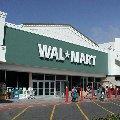'Big-Box' Stores' Prices, Convenience Thrill Shoppers
The American landscape is full of gigantic stores as large as 30,000 square meters [323,000 square feet] in size. Many are discount operations like Wal-Mart, Target, and Price Club, which offer consumers convenient one-stop shopping. Customers love their low prices and vast selection, especially during the current recession. So shopping-center developers keep building them.
But not everyone adores mega-stores. The National Trust for Historic Preservation calls them big boxes and has published guidebooks on how to keep them out of town. And cities like Fort Collins, Colorado, and Charlottesville, Virginia, have banned big-box stores. Other places have called a temporary halt to mega-stores while they decide how to deal with them.
As Rockville, Maryland's, former mayor, Rose Krasnik, once put it, "They are not aesthetically pleasing. When you walk in, you're looking at a windowless, cinderblock warehouse." And outside at peak shopping times, you can also be looking at a traffic quagmire, especially when two or three mega-stores locate in the same shopping complex. Shoppers converging from throughout a metropolitan area are, of course, exactly why smaller retailers want to cluster around these big-box stores.
The cities that have banned giant discount stores are not impressed by their low prices. They call it predatory pricing because so-called mom-and-pop shops and downtown department stores cannot hope to offer the same vast selection and cheap prices. When smaller stores are driven out of business, the life is sucked out of downtown and neighborhood shopping centers.
And what happens when a big-box store goes out of business? It leaves behind an ugly, empty hulk that can be hard to fill, and a sea of empty asphalt around it. This abandoned eyesore, in turn, drives people away from the same shopping malls that the big-box store once made so popular.
I'm Ted Landphair.

